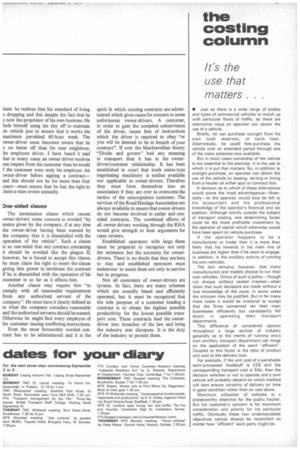It's the use that matters. .
Page 53

If you've noticed an error in this article please click here to report it so we can fix it.
• Just as there is a wide range of bodies and types of commercial vehicles to match up with particular flows of traffic, so there are alternative ways an operator can obtain the use of a vehicle.
Briefly, he can purchase outright from his own cash reserves, or bank loan, Alternatively, he could hire-purchase the vehicle over an extended period through one of the many schemes now available.
But in most cases ownership of the vehicle is not essential to the exercise. It is the use to which it is put that matters. So, in addition to outright purchase, an operator can obtain the use of the vehicle by leasing, renting or hiring from a haulier ori either spot or contract hire.
A decision as to which of these alternatives would prove the most advantageous—financially—to the operator would best be left to his accountant and his professional knowledge of the operator's financial and tax position. Although strictly outside the subject of transport costing, one determining factor could be the more profitable investment by the operator of capital which otherwise would have been spent on vehicle purchase.
If the operator happens to be a manufacturer or trader then it is more than likely that his rewards in his main line of business are higher than if he were to engage, in addition, in the ancillary activity of running his own vehicles.
The fact remains, however, that many manufacturers and traders choose to run their own vehicles. Critics of such a policy though not always without vested interest—often claim that such decisions are made without a true knowledge of the costs. In some cases the criticism may be justified. But in far many more cases it would be irrational to accept that the firms concerned ran their main businesses efficiently but consistently fell down in operating their transport departments.
This difference of considered opinion throughout a large section of industry generally as to the merits of running one's own ancillary transport department can hinge on the application of the word "efficient". Coupled to this factor is the ratio of product unit cost to the delivery cost.
For example, if the unit cost of a perishable semi-processed foodstuff is £25 and the corresponding transport cost is 50p, then the decision whether or not to operate one's own vehicle will probably depend on which method will best ensure certainty of delivery on time in good condition rather than on cost alone.
Maximum utilization of vehicles is a praiseworthy objective for the public haulier. But his customer's concern is for maximum consideration and priority for his particular traffic. Obviously these two understandable objectives cannot always be reconciled no matter how -efficient" each party might be.










































































































































